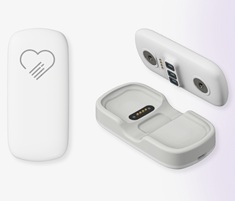
Cardiosense has announced that the US Food and Drug Administration (FDA) has granted 510(k) clearance for the CardioTag device—claimed by the company to be the first multimodal, wearable sensor that simultaneously captures high-fidelity electrocardiogram (ECG), photoplethysmogram (PPG) and seismocardiogram (SCG) signals to provide clinicians and patients with a comprehensive, non-invasive solution to assess cardiac function across care settings.
“Our team is thrilled to achieve this critical milestone as part of our mission to advance cardiac care,” said Amit Gupta, co-founder and chief executive officer (CEO) of Cardiosense. “Traditionally, non-invasive cardiac monitoring has primarily focused on ECG and rhythm analysis. With the CardioTag device, we are adding an entirely new dimension by also capturing physiological data on cardiac mechanics and blood flow, providing unprecedented visibility into a patient’s cardiac function, haemodynamics, and volume status.”
The recent US FDA clearance authorises the CardioTag device for non-invasive measurement of SCG, ECG and PPG signals as well as heart rate and pulse rate.
SCG is a non-invasive technique that measures subtle vibrations on the chest wall associated with cardiac mechanical activity. Clinical studies conducted by Cardiosense have demonstrated that analysing the SCG waveform alongside ECG and PPG signals can be used to accurately assess cardiac timing intervals, such as left ventricular ejection time (LVET)—a measure of how efficiently the heart is pumping blood—compared to the current standard of care.
Cardiosense says it will begin exploring pilot studies of CardioTag paired with artificial intelligence (AI) algorithms using the SCG, ECG or PPG data from the device.
“The CardioTag clearance marks a pivotal step toward clinical adoption and broader access to pressure-guided treatment,” said Andrew Carek, co-founder and chief technology officer (CTO) of Cardiosense. “We’re excited for the foundational role that the CardioTag device will play in building a non-invasive cardiac AI platform, as the signals it collects provide a rich data input upon which AI models for cardiovascular parameters can be developed, such as our pulmonary capillary wedge pressure (PCWP) algorithm.”
A recent prospective, multicentre study published in the Journal of the American College of Cardiology: Heart Failure and presented as late-breaking science at the 2024 American Heart Association (AHA) Scientific Sessions (16–18 November, Chicago, USA), demonstrated that Cardiosense’s AI algorithm for PCWP—which has received US FDA Breakthrough Device designation—could estimate PCWP values with accuracy on par with implantable haemodynamic sensors in heart failure with reduced ejection fraction (HFrEF) patients. Upon regulatory approval for the PCWP analysis software, the algorithm will be paired with the CardioTag device for advanced heart failure management, according to the company.
“This is a deeply meaningful milestone. For over a decade, we’ve worked to turn a bold idea into a clinically reliable, non-invasive technology that truly meets patients where they are. With US FDA clearance, we’re taking a major step toward bringing precision haemodynamic insights into everyday patient care—no matter the setting,” said Omer Inan, co-founder and chief scientific officer at Cardiosense.









